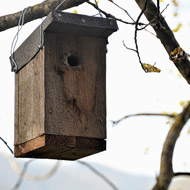British bats ‘stable or recovering’

The report suggests that current legislation and conservation action is proving successful.
British bat populations are ‘stable or recovering’, according to new data published by the Bat Conservation Trust.
The State of the UK’s Bats 2017 report shows that of the 18 resident species, the majority are increasing in number or are stable. The Bat Conservation Trust said this suggests that current legislation and conservation action is proving successful.
However, it also warns that bat populations still face many pressures, including ongoing roost and habitat loss, increased urbanisation, artificial lighting and wind turbines.
Commenting on the report, Dr Kirsi Peck, Joint Nature Conservation Committee (JNCC) Biodiversity Support Officer, said: “The report published today indicates that the protection measures afforded to UK bats are working. The NBMP’s high-quality evidence on bat population trends is an important corner-stone to the advice we give to support decisions that affect the environment bats rely on.”
The State of the UK’s Bats 2017 report provides a summary of species population trends up to 2016 and looks at some of the results in more detail to highlight key findings and conservation issues. The data used in the report have been collected from more than 1000 people who count bats in a number of different surveys across the UK.
Besides providing insights on population trends, the data are used to better understand how bats use our landscape and to provide practical recommendations on how landscapes can be improved for bats.
Philip Briggs, Bat Conservation Trust (BCT) monitoring manager, said: “In the UK we are fortunate to have an amazing conservation volunteering culture and it is thanks to the dedication of our many volunteers that we are able to track how more than half of our native bat species are faring and make exciting new discoveries about these fascinating mammals.”



 The RCVS has announced a new version of its 1CPD mobile app, with enhanced features for veterinary surgeons and veterinary nurses to record their continuing professional development.
The RCVS has announced a new version of its 1CPD mobile app, with enhanced features for veterinary surgeons and veterinary nurses to record their continuing professional development.